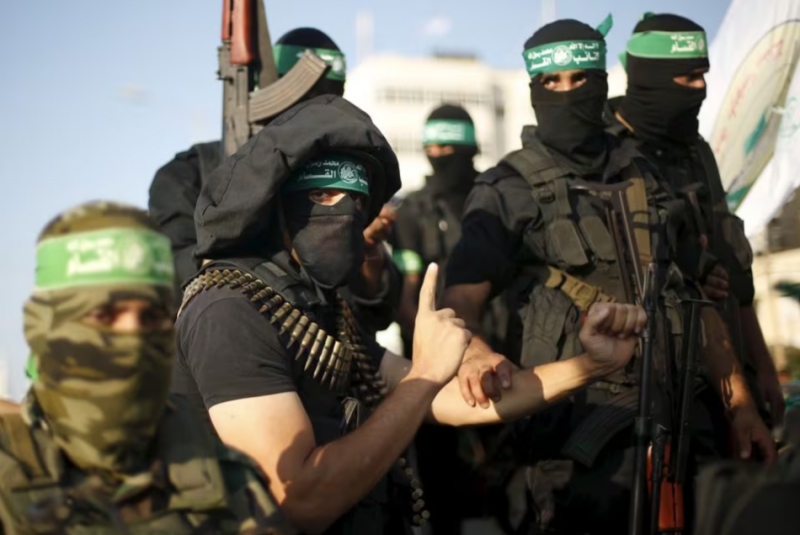
Hamas militants take part in a military parade in Gaza City Aug. 26, 2015. (Credit: Suhaib Salem/Reuters/File Photo)
Hamas has projected a united front since its Oct. 7 attack sparked war with Israel, but experts say divisions within the Palestinian movement have weighed on efforts towards a cease-fire.
In self-exile in Doha, the head of Hamas's political bureau Ismail Haniyeh is talking openly with Qatari authorities and mediators.
Meanwhile the group's leader in the Gaza Strip, Yahya Sinwar, is in hiding after Israel vowed to pursue the presumed brains behind the October attack to the death.
The top Gaza leader is absent from truce talks, but mediators have to take both his and Haniyeh's positions — as well as Israel's — into account.
Hamas forces on the ground including the group's military wing, Ezzedine al-Qassam Brigades, answer to Sinwar.
A source close to the mediation efforts, led by Qatar, Egypt and the United States, told AFP that every proposal sent to Hamas' political bureau has to be communicated to officials inside Gaza.
"Any change means communication back and forth," said the source, requesting anonymity due to the sensitivity of the issue.
Eva Koulouriotis, an independent Middle East analyst, said Hamas' "loudest voice" Sinwar has sidelined political chief Haniyeh.
According to the US military's CTC Sentinel journal, "the Gaza-based leadership has become the most prominent given its control of the territory" which presents it with financial and military advantages."
Differences of opinion between Haniyeh and Sinwar could put both leaders to the test: who has the final word, can they maintain a display of unity, and will Gaza's future be decided at the negotiations table — or on the battlefield?
'Stark differences'
Sinwar has gradually tightened his grip on Hamas since his release from jail under a 2011 prisoner exchange with Israel, including by making his brother a key military commander.
"Haniyeh's role was marginalized and confined to the political office," said Koulouriotis, with the balance of power affecting the course of the war.
Sinwar "believes that diplomacy should only be a means to support military action" but he is under pressure from the political wing to make concessions, the expert added.
Hamas' military and political leaders avoid airing their differences in public, said Sharmine Narwani, a columnist at the Beirut-based geopolitics journal The Cradle.
But there are "stark differences in the way the region's 'Axis of Resistance' interacts with these two distinct groups and their philosophies," said Narwani, referring to Iran-backed Hamas allies in the region.
Al-Qassam Brigades, like other "Axis of Resistance" groups such as Yemen's Houthi rebels or Hezbollah in Lebanon, "view armed struggle as a tenet" of their mission, she said.
Hamas, designated a "terrorist" group by Israel, the United States, and the European Union, has seen internal divisions for years, according to CTC Sentinel analysts Devorah Margolin and Matthew Levitt.
Power struggles between its hardline and more moderate factions were put on display when Hamas stood in the last Palestinian general elections, held in 2006.
"The group's leaders were crystal clear that Hamas' participation in elections did not mean the group had moderated its position calling for the destruction of Israel," the analysts said.
'On the run'
The group launched its unprecedented October attack on Israel possibly without the full knowledge of the political bureau, said Nashaat Aqtash, of Birzeit University in the occupied West Bank.
Hamas' compartmentalized power structure meant political leaders abroad were likely aware of some plans, but not of specific details or tactics, Aqtash told AFP.
Israel, unable or unwilling to operate against Haniyeh in Qatar, vowed to go after Sinwar.
On Monday, Israeli Defence Minister Yoav Gallant said Sinwar was moving "from hideout to hideout" in Gaza and had become "a terrorist on the run," no longer in charge and primarily trying to save his own skin.
Convincing Sinwar and senior officials close to him will be key to securing any truce deal, said Aqtash.
But he added that "nobody knows" exactly where Sinwar is or whether conditions allow him to personally review any proposals.
And either way, getting Sinwar on board may be a tall order, as he answers to no one.
"Nobody can control al-Qassam Brigades, not the Arab countries, not Iran, not the political bureau, not anybody else," Aqtash said.
In self-exile in Doha, the head of Hamas's political bureau Ismail Haniyeh is talking openly with Qatari authorities and mediators.
Meanwhile the...